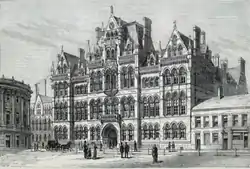Sir Leonard Gregory Parsons MRCS FRCP FRCOG FRS (25 November 1879 - 17 December 1950) was a British Paediatrician.[1]
Parsons studied at Mason College and the University of Birmingham from 1896 to 1903. He graduated with a University of London external degree in medicine in 1903.[2][3][4]
He was Professor of Paediatrics at Birmingham University and dean of University of Birmingham Medical School. In 1932 he was the first to use synthetic Vitamin C to treat scurvy in children.[5][6][7][8]
Parsons was awarded the Royal College of Physicians’s Moxon Medal in 1942 and delivered their Harveian Oration in 1950. He received a knighthood in 1946. He was elected a Fellow of the Royal Society in 1948.[9]
References
- ↑ "Inspiring Physicians | RCP Museum".
- ↑ "Inspiring Physicians | RCP Museum".
- ↑ Dunn, PM (2002). "Sir Leonard Parsons of Birmingham (1879-1950) and antenatal paediatrics". Arch. Dis. Child. Fetal Neonatal Ed. 86 (1): F65–7. doi:10.1136/fn.86.1.F65. PMC 1721345. PMID 11815555.
- ↑ "Archived copy" (PDF). Archived from the original (PDF) on 4 March 2016. Retrieved 20 December 2014.
{{cite web}}: CS1 maint: archived copy as title (link) - ↑ Dunn, PM (2002). "Sir Leonard Parsons of Birmingham (1879-1950) and antenatal paediatrics". Arch. Dis. Child. Fetal Neonatal Ed. 86 (1): F65–7. doi:10.1136/fn.86.1.F65. PMC 1721345. PMID 11815555.
- ↑ "Archived copy" (PDF). Archived from the original (PDF) on 4 March 2016. Retrieved 20 December 2014.
{{cite web}}: CS1 maint: archived copy as title (link) - ↑ "Inspiring Physicians | RCP Museum".
- ↑ "Sir Leonard Parsons of Birmingham (1879–1950) and antenatal paediatrics -- Dunn 86 (1): F65 -- ADC - Fetal and Neonatal Edition". Archived from the original on 18 January 2013. Retrieved 20 December 2014.
- ↑ "Inspiring Physicians | RCP Museum".
This article is issued from Wikipedia. The text is licensed under Creative Commons - Attribution - Sharealike. Additional terms may apply for the media files.
